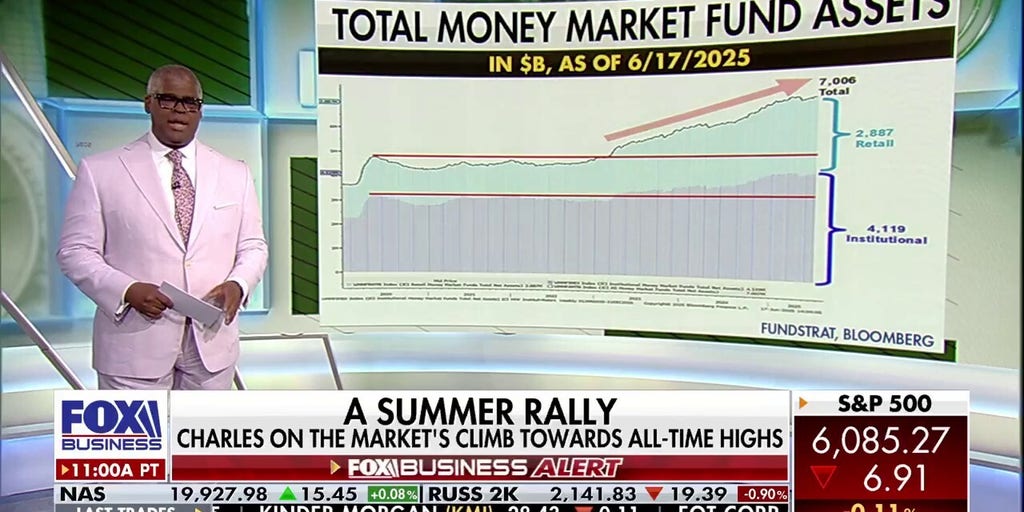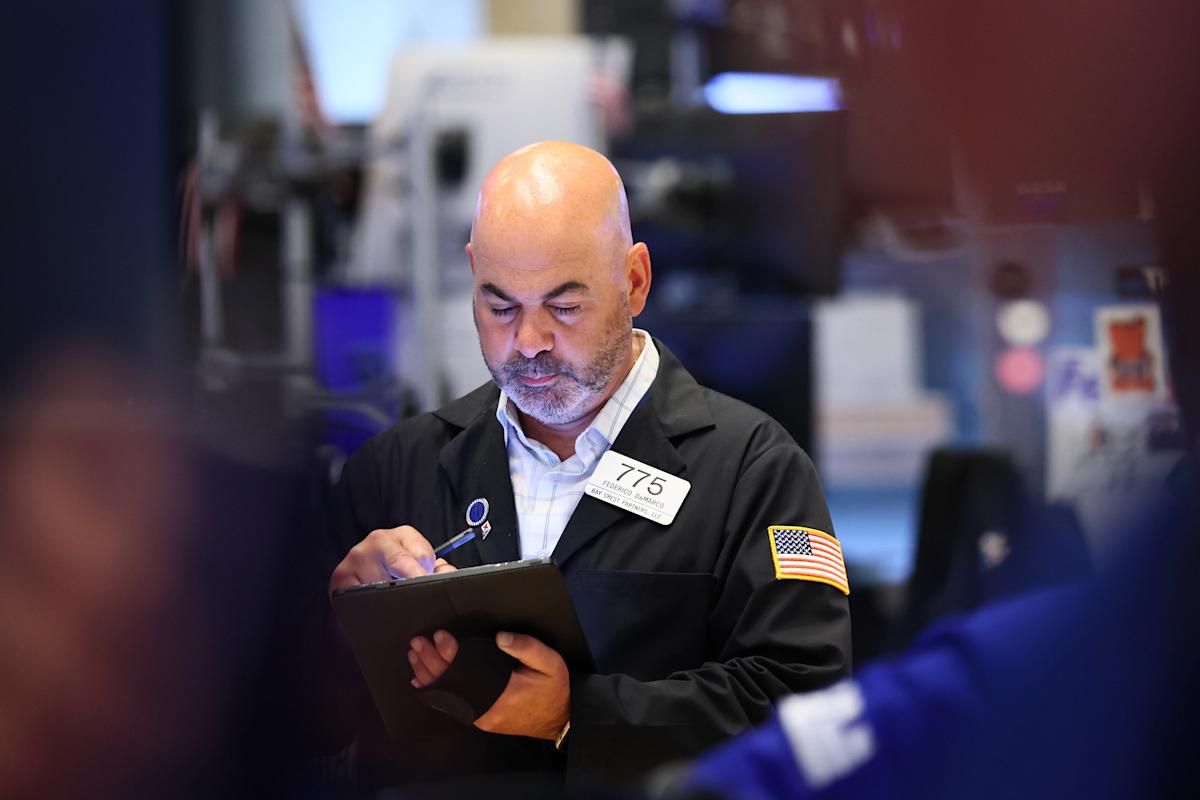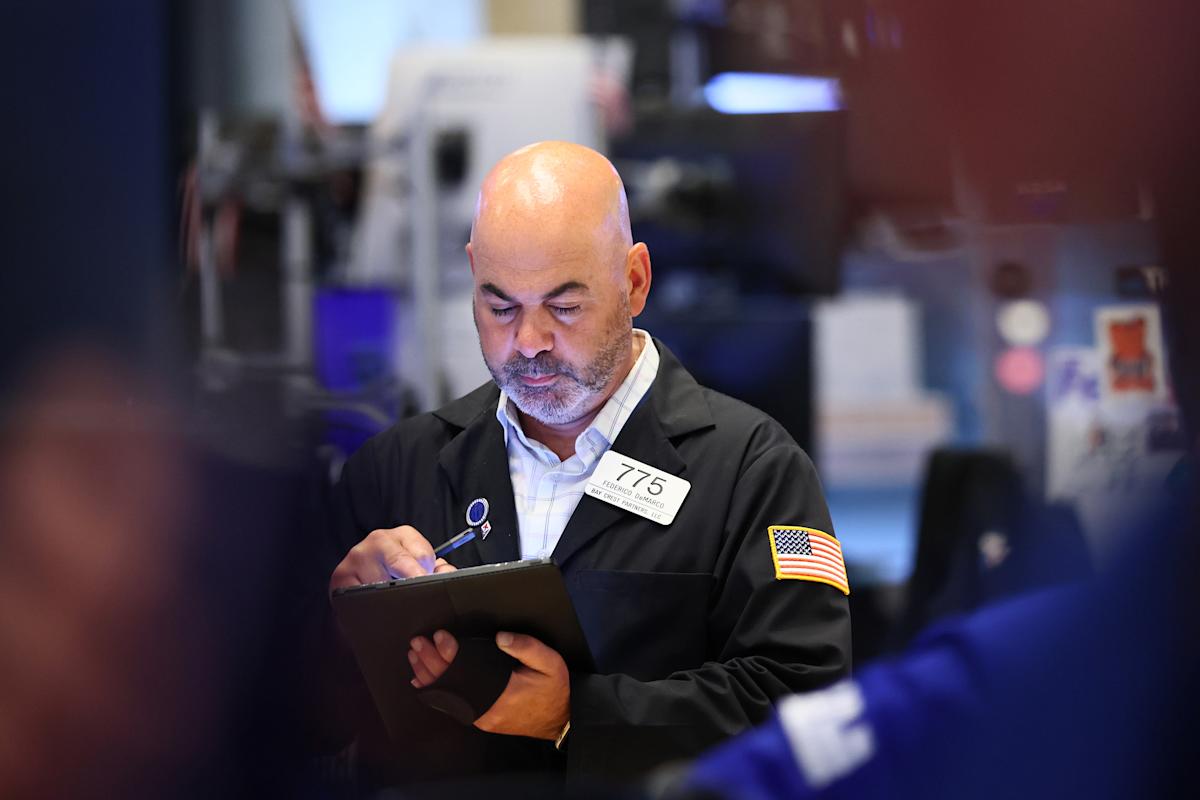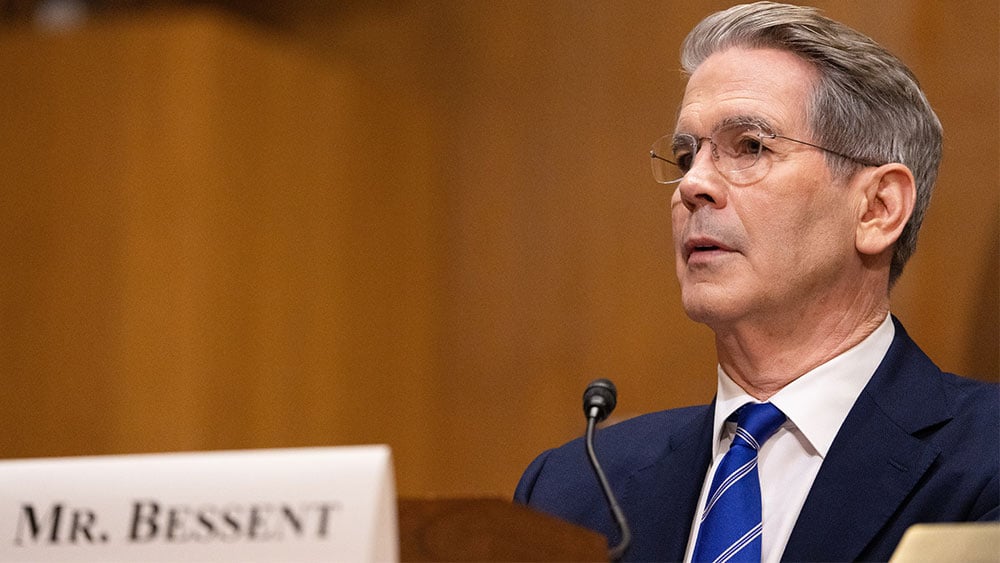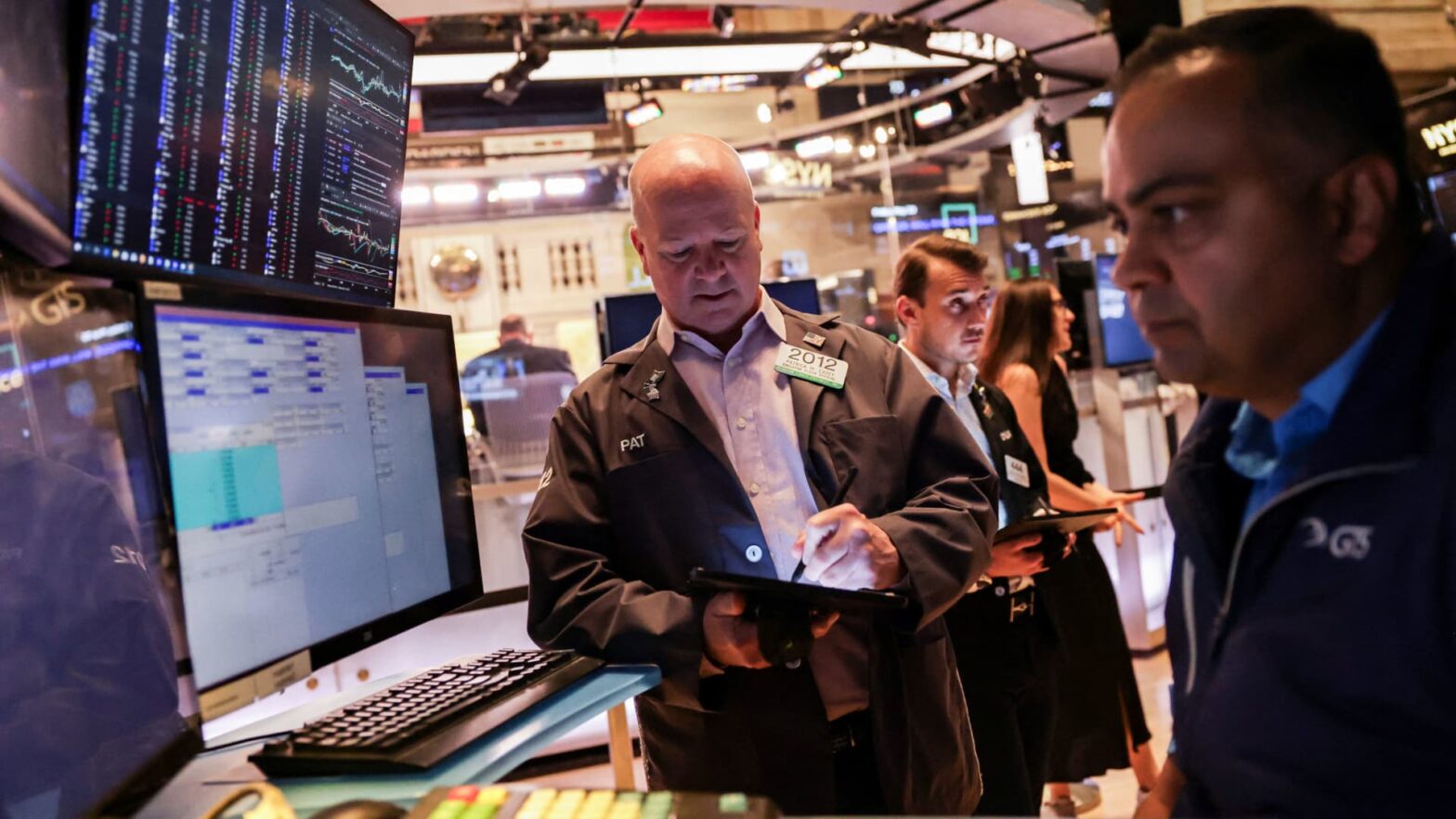Updated 2 min read
In This Article:
US stocks were a mixed bag on Wednesday as Wall Street digested a sharp slowdown in private-sector hiring growth, with one eye on prospects for US-China trade talks as a steel tariff hike kicked in.
The S&P 500 (^GSPC) was narrowly positive on the day, while the tech-heavy Nasdaq Composite (^IXIC) rose more than 0.3%. The Dow Jones Industrial Average (^DJI) slipped about 0.2%, ending a four-day winning streak.
Meanwhile, the 10-year Treasury yield (^TNX) and the 30-year Treasury yield (^TYX) both fell nearly 10 basis points as investors digested a slew of weaker-than-expected economic data. The 10-year hovered near 4.36%, its lowest level since May 9.
On the data front, the ADP National Employment Report showed private-sector hiring growth fell sharply last month. Private payrolls increased by just 37,000, the lowest in over two years and well below expectations.
Meanwhile, in another sign of tariff uncertainty weighing on economic data, the Institute for Supply Management’s Services PMI registered a reading of 49.9 in May, below the 51.6 seen in April and lower than the increase to 52 economists had expected. May’s data marked just the fourth time the services sector has fallen into contraction in the past five years.
Trump lashed out at Jerome Powell after seeing the ADP report early Wednesday, urging the Federal Reserve chair to lower interest rates.
“He is unbelievable!!!” Trump posted.
Overnight, Trump’s Tuesday order doubling tariffs on steel and aluminum imports to 50% came into effect, with only the UK spared the jump in duties on Wednesday. Meanwhile, Wednesday is deadline day for trading partners to make “best offers” for a deal to fend off “reciprocal” tariff hikes scheduled for July.
Read more: The latest on Trump’s tariffs
Optimism for a US-China trade pact dimmed after Trump called President Xi “extremely hard to make a deal with” in a post to social media early Wednesday morning. The Geneva tariff truce between the two has appeared increasingly fragile amid clashes over issues such as chip exports, rare earth supplies, Taiwan, and visas.
LIVE COVERAGE IS OVER 20 updates
-
One reason stocks haven’t been moving as much on tariff headlines
US stocks largely closed higher on Wednesday after another day of President Trump teasing out that negotiations with trading partners might not be going great.
Going back to April, any kind of negative tariff headlines were weighing on the stock market significantly. But in recent sessions that hasn’t been the case.
Barclays head of US equity strategy Venu Krishna told Yahoo Finance that the recent market action has been a part of the “broad realization” that the extreme levels of tariffs can’t be taken at face value.
Krishna and other strategists have also pointed out that the peak level of tariff uncertainty, which came when Trump jacked the effective US tariff rate to its highest level in more than a decade, has already passed.
Morgan Stanley chief investment officer Mike Wilson showed this by looking at how market volatility, as measured by the CBOE Volatility Index, or VIX, has moved lower in tandem with Bloomberg’s US Trade Policy Uncertainty Index, which analyzes news articles for mentions of trade policy and uncertainty.
“The bottom line is that while uncertainty remains high around the eventual tariff outcome, the rate of change on policy headwinds has become much less onerous.” Wilson wrote. “This has reduced recession risk and is giving corporates and consumers more confidence in the forward looking outlook.”
-
Latest data shows signs of a ‘pause’ in US economy
Multiple economic data points have shown signs of slowing in the US economy during the month of May.
On Wednesday, the Institute for Supply Management’s Services PMI registered a reading of 49.9 in May, below the 51.6 seen in April. Readings above 50 for this index indicate an expansion in activity, while readings below 50 indicate contraction. May’s data marked just the fourth time the services sector has fallen into contraction in the past five years.
Jefferies US economist Tom Simons wrote in a note to clients that the data likely reflect “more signs of a pause in activity rather than a steep contraction.”
“A broad pause is not a good thing, and the uncertainty that precipitated this pause has not shown any signs of lifting,” Simons wrote.
And it’s not just one sector showing this either. On Monday, the ISM’s Manufacturing PMI also showed contraction in May as imports hit their lowest level since 2009, as the wide swath of President Trump’s tariffs took hold.
Economists have reasoned that it’s not just the tariffs themselves that cause businesses to slow activity. Rather, it’s the uncertainty of where policy and, eventually, the broader economic environment are headed in 2025. In May, the private sector added 37,000 jobs, the lowest monthly total in more than two years, per ADP data.
“When it comes to hiring, there’s a hesitancy because of a wide level of uncertainty,” ADP chief economist Nela Richardson told Yahoo Finance during a call with reporters.
-
Michael Saylor’s bitcoin imitators are multiplying, from Trump to GameStop
We detailed last week in the Yahoo Finance Morning Brief that GameStop (GME) is adopting the Strategy playbook and buying up bitcoin (BTC-USD).
But as Yahoo Finance’s Laura Bratton and David Hollerith reported today, it’s far more than just GameStop adding bitcoin to their balance sheet. In all, 80 companies hold bitcoin as part of their treasury reserves and now hold roughly 3.4% of all bitcoins in circulation, according to Bernstein analyst Gautam Chhugani.
While most of these companies aren’t going full Strategy and making owning bitcoin their key investor pitch, this does feel like yet another sign of crypto becoming a further part of the mainstream investor conversation.
-
Late-night social media and surprise tariffs complicate Trump’s two biggest trade talks
Yahoo Finance’s Ben Werschkul reports:
-
Apple stock hit with downgrade by Needham analysts, citing stiff AI competition
Yahoo Finance’s Laura Bratton reports:
-
There’s a new ETF focused on the AI revolution — and it’s backed by a well-known tech analyst
Wall Street tech bull Dan Ives is putting his AI conviction to the test.
On Wednesday, Wedbush Fund Advisers launched the Dan IVES Wedbush AI Revolution ETF, which will trade on the New York Stock Exchange under the ticker symbol IVES. The new exchange-traded fund is built on Ives’s proprietary research and aims to provide investors with targeted exposure to the booming artificial intelligence sector.
“The AI revolution is the biggest tech theme we’ve ever seen,” Ives told Yahoo Finance in a phone interview following the announcement. “I’ve started [this] ETF because it’s about the second, third, fourth derivatives of AI playing out, and that’s the important thing for investors.”
The fund tracks 30 publicly traded companies handpicked from Ives’s “AI Revolution Theme,” a research framework that identifies firms with meaningful exposure to AI infrastructure, deployment, and monetization.
The ETF spans a range of sectors, including semiconductors, hyperscalers, cybersecurity, consumer platforms, robotics, and cloud infrastructure. Holdings include major AI players like Nvidia (NVDA), tech giants such as Microsoft (MSFT), and defense-focused firms like Palantir (PLTR). Chinese companies Alibaba (BABA) and Baidu (BIDU) are also featured to capture exposure to AI developments in Asia.
Reflecting on his investment approach, Ives explained, “I’ve never been too focused on valuations. It’s about the themes, the best places, and the disruptors. That’s all the work we do in the field.”
-
Treasury yields slide after weak economic data releases
The 10-year Treasury yield (^TNX) and the 30-year Treasury yield (^TYX) both fell about 8 basis points as investors digested a slew of weaker-than-expected economic data..
On Wednesday, data from ADP showed private payrolls grew by just 37,000 in May, far fewer than the 114,000 expected by economists and below the 60,000 new jobs added in April. This marked the smallest increase in private payrolls since March 2023.
In another sign that tariff uncertainty is weighing on economic data, the Institute for Supply Management’s Services PMI registered a reading of 49.9 in May, below the 51.6 seen in April and lower than the increase to 52 economists had expected. Readings above 50 for this index indicate an expansion in activity, while readings below 50 indicate contraction. May’s data marked just the fourth time the services sector has fallen into contraction in the past five years.
Read more about the economic data releases from Wednesday morning here.
-
Tesla stock slumps amid Musk-Trump budget rumpus
Yahoo Finance’s Pras Subramanian reports:
-
Services sector falls into contraction for first time since June 2024
Activity in the services sector has fallen into contraction for the first time in a year.
The Institute for Supply Management’s Services PMI registered a reading of 49.9 in May, below the 51.6 seen in April and lower than the increase to 52 economists had expected. Readings above 50 for this index indicate an expansion in activity, while readings below 50 indicate contraction. May’s data marked just the fourth time the services sector has fallen into contraction in the past five years.
New orders tumbled to a reading of 46.4 in May, below the 52.3 seen the month prior. Meanwhile, the prices paid index increased to 68.7, up from 65.1 in April. This marked the highest prices paid reading since November 2022, when the Consumer Price Index had shown inflation at 7.1%.
Steve Miller, the chair of ISM’s Services Business Survey, said in the release that “Tariff impacts are likely elevating prices paid.”
“May’s PMI level is not indicative of a severe contraction, but rather uncertainty that is being expressed broadly among ISM Services Business Survey panelists,” Miller said. “The average reading of 50.8 percent over the last three months still indicates expansion in that time period, but it is a notable shift of 2 percentage points below its average of 52.8 percent over the previous nine months.”
-
Stocks open higher
US stocks inched higher on Wednesday as Wall Street digested a sharp slowdown in private-sector hiring growth, with one eye on prospects for US-China trade talks as a steel tariff hike kicked in.
The S&P 500 (^GSPC) rose about 0.2%, while the Dow Jones Industrial Average (^DJI) added over 0.1%. The tech-heavy Nasdaq Composite (^IXIC) gained more than 0.2% to build on the major indexes’ strong start to the week.
-
Private sector adds lowest monthly payrolls since March 2023
On Wednesday, data from ADP showed private payrolls grew by just 37,000 in May, far fewer than the 114,000 expected by economists and below the 60,000 new jobs added in April. This marked the smallest increase in private payrolls since March 2023.
“The weak numbers we’re seeing now does not point to a labor market that’s collapsing, but there is hiring hesitancy,” ADP chief economist Nela Richardson said on a call with reporters.
President Trump posted about the numbers on Truth Social shortly after the release.
“ADP NUMBER OUT!!! “Too Late” Powell must now LOWER THE RATE,” Trump posted. “He is unbelievable!!! Europe has lowered NINE TIMES!”
-
Nvidia stock adds to gains after the company overtook Microsoft as most valuable company
Nvidia (NVDA) stock advanced 0.5% in premarket trading, adding to its $1 trillion rally that saw it surpass Microsoft (MSFT) as the world’s most valuable company by market capitalization.
Nvidia’s market cap stands at $3.444 trillion following a more than 50% rally in May, compared to Microsoft’s valuation of $3.441 trillion.
The stock has gained more than 4% since reporting first quarter earnings last week. Nvidia is scheduled to present at the BofA Securities Global Technology Conference on Wednesday, which could prompt additional moves.
-
Dollar Tree warns of tariff impact in second quarter
Dollar Tree (DLTR) reported first quarter revenue and earnings today that beat analysts’ expectations but said it sees a big hit to second quarter results due to tariffs.
The company forecast adjusted profit to be down 45% to 50% from a year ago in the second quarter due to tariff volatility and price hikes. However, it expects profits to pick back up in the second part of the year.
Dollar Tree’s earnings report follows results from Dollar General (DG) yesterday that beat estimates and included an annual sales forecast raise. Dollar Tree maintained its annual sales outlook and raised its earnings per share outlook to a range of $5.15 to $5.65.
Dollar Tree stock fell 0.5% in premarket trading on Wednesday after bouncing back and forth between positive and negative territory.
-
Good morning. Here’s what’s happening today.
-
Bull and bear cases don’t see tariffs changing the Apple stock story
When it comes to Apple stock both the bull and the bear cases are unfazed by tariffs, despite the fact these levies and presidential threats could deflate the company, bull and bear arguments tend to focus on the tech company’s well established products and competitor advantage.
Despite the political landscape changing for Apple CEO Tim Cook, for Wall Street the story remains the same.
The bull case is focused on strong earnings, a legacy built on underpromising and overdelivering. Delivering stable results and always managing expectations. But this may be hard to see now.
My colleague, Yahoo Finance’s senior reporter Hamza Shaban looks at why Apple bull and bear cases don’t see tariffs changing the story.
-
China weighs massive Airbus deal, seen as message to Trump
Jets are taking center stage as countries vie for President Trump’s attention — and China could be the latest, with a potential Airbus (AIR.PA, EADSY) deal.
Chinese airlines are considering placing an order for as many as 500 Airbus planes to coincide with a visit by European leaders to Beijing in July, sources told Bloomberg.
Deals for US rival Boeing’s (BA) planes have emerged as the US’s favored bargaining chip in trade discussions. The spotlight fell on the gambit after Trump’s acceptance of a $400 million luxury Boeing jet from the Qatari royal family in May, for use in the Air Force One fleet.
Though China’s Airbus negotiations are said to be fluid and could fall through, the European jet maker’s stock rose as much as 4% in Paris. Meanwhile, shares of Boeing hovered below the flat line.
Bloomberg reports:
-
Michael Saylor’s bitcoin imitators are multiplying fast
Dozens of publicly traded companies, a media firm controlled by President Trump’s family, and meme stock poster child GameStop (GME) are all piling into a bet that Michael Saylor used to turn a business intelligence software firm into a bitcoin juggernaut called Strategy (MSTR).
Yahoo Finance’s David Hollerith and Laura Bratton report:
-
Trending tickers: CrowdStrike, HPE, Robinhood and Wells Fargo
Here are some top stocks trending on Yahoo Finance in premarket trading:
CrowdStrike (CRWD) stock fell over 6% before the bell on Wednesday after the technology company forecast Q2 earnings below estimates, indicating weaker government spending on cybersecurity products.
HPE (HPE) beat Wall Street estimates for second-quarter revenue and profit on Tuesday, due to strong demand for its artificial-intelligence servers and hybrid products. The groups stock price was up 5% before the bell on Wednesday.
Robinhood (HOOD) stock rose over 1% in premarket trading on Wednesday. Nearly four years after its much-hyped debut, Robinhood Markets Inc. has finally seen its shares hit a fresh record as cryptocurrency markets rally. Robinhood’s stock rose over 5% on Tuesday and closed at $71.72, beating its previous high of $70.39, which was set days after the online brokerage’s IPO.
Wells Fargo (WFC) shares were up 3% before the bell today after the Federal Reserve a major restriction on the investment bank, meaning it will no longer have to operate under a $1.95T asset cap.
-
Action in Hong Kong equity markets stirs most excitement in years
Despite global unrest, trade war threats and persistently sluggish demand in China, investors are clamoring for a piece of the stock action in Hong Kong as valuations are still attractive.
Bloomberg reports:
-
Toyota Industries offer to pivot to private tanks share value
Stock in Toyota Industries (6201.T) sank over 12% late Tuesday after an attempt to take the company private failed to meet investor expectations. A ¥4.7 trillion ($33 billion) deal offered ¥16,300 yen per share, well below Tuesday’s close of ¥18,400.
Parent company Toyota Motor Corporation (TM) has been trying to take the forklifts, engines, and auto parts manufacturer Toyota Industries off the stock market under pressure from government regulators and investors to pull apart entwined company structures.
Toyota’s tender offer drew criticism as it “undermines” minority shareholders. According to Reuters, the offer values the buyout at $26 billion, with the remaining financing structured through loans and preferred share investments.
If the deal goes through a new company will be established. Toyota Motor will invest around ¥700 billion in non-voting shares, while its real estate arm, Toyota Fudosan, will contribute ¥180 billion. Chairman Akio Toyoda plans a ¥1 billion personal investment.




